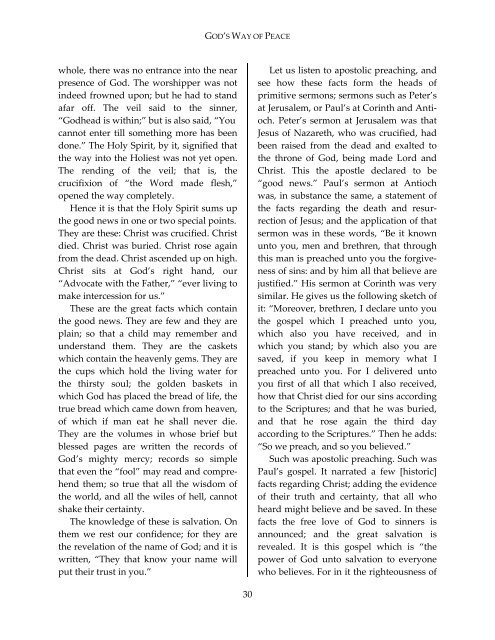God's Way of Peace by Horatius Bonar, D.D.
The seasoned Scottish pastor wrote this short devotional for those suffering from guilt, anxiety, or the consequences of sin. He writes with neither chastisement nor condemnation, but rather immediately directs his readers to Christ’s gift of salvation through his death and resurrection. Bonar reminds all that the Gospel offers hope for the sinner and comfort for the troubled, for God’s perfect, constant grace never fails those who accept it. From Bonar’s time to the present, people have found peace with God afresh through this book. Many people report having read it several times, and turning to it again and again when troubles arise. Kathleen O’Bannon CCEL Staff
The seasoned Scottish pastor wrote this short devotional for those suffering from guilt, anxiety, or the consequences of sin. He writes with neither chastisement nor condemnation, but rather immediately directs his readers to Christ’s gift of salvation through his death and resurrection. Bonar reminds all that the Gospel offers hope for the sinner and comfort for the troubled, for God’s perfect, constant grace never fails those who accept it. From Bonar’s time to the present, people have found peace with God afresh through this book. Many people report having read it several times, and turning to it again and again when troubles arise.
Kathleen O’Bannon
CCEL Staff
You also want an ePaper? Increase the reach of your titles
YUMPU automatically turns print PDFs into web optimized ePapers that Google loves.
GOD’S WAY OF PEACE<br />
whole, there was no entrance into the near<br />
presence <strong>of</strong> God. The worshipper was not<br />
indeed frowned upon; but he had to stand<br />
afar <strong>of</strong>f. The veil said to the sinner,<br />
“Godhead is within;” but is also said, “You<br />
cannot enter till something more has been<br />
done.” The Holy Spirit, <strong>by</strong> it, signified that<br />
the way into the Holiest was not yet open.<br />
The rending <strong>of</strong> the veil; that is, the<br />
crucifixion <strong>of</strong> “the Word made flesh,”<br />
opened the way completely.<br />
Hence it is that the Holy Spirit sums up<br />
the good news in one or two special points.<br />
They are these: Christ was crucified. Christ<br />
died. Christ was buried. Christ rose again<br />
from the dead. Christ ascended up on high.<br />
Christ sits at God’s right hand, our<br />
“Advocate with the Father,” “ever living to<br />
make intercession for us.”<br />
These are the great facts which contain<br />
the good news. They are few and they are<br />
plain; so that a child may remember and<br />
understand them. They are the caskets<br />
which contain the heavenly gems. They are<br />
the cups which hold the living water for<br />
the thirsty soul; the golden baskets in<br />
which God has placed the bread <strong>of</strong> life, the<br />
true bread which came down from heaven,<br />
<strong>of</strong> which if man eat he shall never die.<br />
They are the volumes in whose brief but<br />
blessed pages are written the records <strong>of</strong><br />
God’s mighty mercy; records so simple<br />
that even the “fool” may read and comprehend<br />
them; so true that all the wisdom <strong>of</strong><br />
the world, and all the wiles <strong>of</strong> hell, cannot<br />
shake their certainty.<br />
The knowledge <strong>of</strong> these is salvation. On<br />
them we rest our confidence; for they are<br />
the revelation <strong>of</strong> the name <strong>of</strong> God; and it is<br />
written, “They that know your name will<br />
put their trust in you.”<br />
Let us listen to apostolic preaching, and<br />
see how these facts form the heads <strong>of</strong><br />
primitive sermons; sermons such as Peter’s<br />
at Jerusalem, or Paul’s at Corinth and Antioch.<br />
Peter’s sermon at Jerusalem was that<br />
Jesus <strong>of</strong> Nazareth, who was crucified, had<br />
been raised from the dead and exalted to<br />
the throne <strong>of</strong> God, being made Lord and<br />
Christ. This the apostle declared to be<br />
“good news.” Paul’s sermon at Antioch<br />
was, in substance the same, a statement <strong>of</strong><br />
the facts regarding the death and resurrection<br />
<strong>of</strong> Jesus; and the application <strong>of</strong> that<br />
sermon was in these words, “Be it known<br />
unto you, men and brethren, that through<br />
this man is preached unto you the forgiveness<br />
<strong>of</strong> sins: and <strong>by</strong> him all that believe are<br />
justified.” His sermon at Corinth was very<br />
similar. He gives us the following sketch <strong>of</strong><br />
it: “Moreover, brethren, I declare unto you<br />
the gospel which I preached unto you,<br />
which also you have received, and in<br />
which you stand; <strong>by</strong> which also you are<br />
saved, if you keep in memory what I<br />
preached unto you. For I delivered unto<br />
you first <strong>of</strong> all that which I also received,<br />
how that Christ died for our sins according<br />
to the Scriptures; and that he was buried,<br />
and that he rose again the third day<br />
according to the Scriptures.” Then he adds:<br />
“So we preach, and so you believed.”<br />
Such was apostolic preaching. Such was<br />
Paul’s gospel. It narrated a few [historic]<br />
facts regarding Christ; adding the evidence<br />
<strong>of</strong> their truth and certainty, that all who<br />
heard might believe and be saved. In these<br />
facts the free love <strong>of</strong> God to sinners is<br />
announced; and the great salvation is<br />
revealed. It is this gospel which is “the<br />
power <strong>of</strong> God unto salvation to everyone<br />
who believes. For in it the righteousness <strong>of</strong><br />
30

















